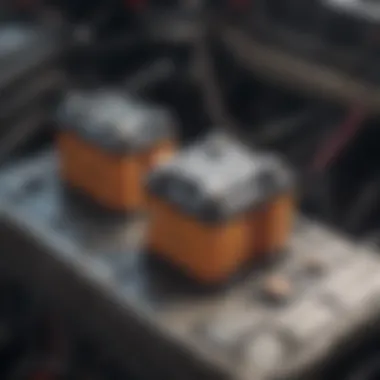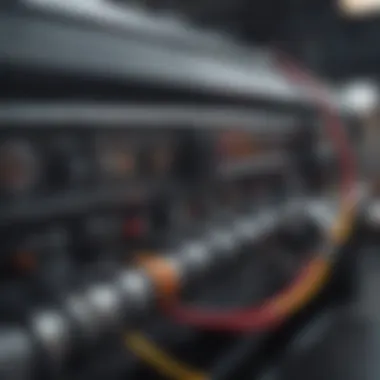Affordable Car Electrical Repair Solutions


Intro
Car electrical repair can often be a daunting and costly venture for many vehicle owners. The complexity of modern automotive electrical systems, combined with the potential high costs of professional repairs, leaves many wondering about affordable solutions. Understanding the common electrical issues, assessing when to take matters into your own hands, and learning about preventive measures can empower you as a car owner to deal with these challenges.
This article aims to enlighten readers on a range of budget-friendly options for car electrical repairs. Through a detailed exploration, we will highlight common problems, discuss do-it-yourself strategies, and help identify when it may be best to consult a professional. By the end, you will have a clearer perspective on how to maintain your vehicle’s electrical system while keeping costs manageable. The focus is on equipping you with the knowledge to make informed and effective choices regarding your car's electrical health.
Understanding Common Car Electrical Issues
Electrical problems in cars can manifest in various ways. Issues like battery failure, faulty wiring, and malfunctioning alternators can lead to significant operational setbacks. To navigate these problems efficiently, familiarity with the symptoms and causes of electrical system failures is crucial.
- Battery problems often show up as difficulty in starting the vehicle or dim lights. A simple battery check can sometimes resolve these issues.
- Wiring issues might cause erratic behaviors like flickering lights or complete power loss in certain functions.
- Alternator failures can lead to a dead battery as it is responsible for recharging the battery while the engine runs.
By recognizing these typical indicators, you can address problems earlier and potentially reduce repair costs.
Approaches to Affordable Repairs
DIY Fixes
When facing minor electrical issues, many car owners find success in DIY repairs. Basic knowledge can make a difference. Tools like multimeters can be used to check battery voltage, wiring integrity, and more. Online resources and forums provide guidance on specific repairs that you can perform, depending on your skill level. Websites like Reddit and Facebook groups dedicated to automotive repairs often contain invaluable advice from fellow enthusiasts.
Professional Help
In some cases, professional assistance may be unavoidable. However, understanding when to seek help is crucial. If the problem is extensive or requires specialized equipment, a qualified mechanic should be consulted. Nonetheless, there are ways to manage costs when involving professionals. Consider obtaining multiple quotes from different repair shops to compare prices. This can lead to better rates and give you insights into what is reasonable for specific repairs.
Maintaining Your Vehicle’s Electrical System
As a car owner, investing time in maintenance helps to extend the lifespan of your electrical system. Regular checks of the battery, looking for signs of corrosion, and ensuring that the wiring is secure can prevent minor issues from escalating. Additionally, always consult your vehicle’s manual concerning electrical maintenance and any specific recommendations from the manufacturer.
In summary, navigating car electrical repairs on a budget is a challenge that many face. With awareness of common issues and potential DIY solutions, it’s possible to keep costs down while ensuring your vehicle remains reliable. This article will continue to dive deeper into the specific aspects of car electrical systems, providing you with comprehensive knowledge for smarter, affordable repairs.
Understanding Car Electrical Systems
Understanding car electrical systems is crucial for any vehicle owner. These systems are vital for the functioning and safety of the vehicle. They control everything from starting the engine to powering accessories like headlights and air conditioning. A solid grasp of these systems enables users to troubleshoot problems and make informed decisions about repairs and maintenance. A thorough knowledge can also lead to cost-effective solutions for repairs, which is particularly important for budget-conscious car owners.
Components of Vehicle Electrical Systems
Key components play a significant role in the operation of car electrical systems:
- Battery: It provides the initial energy to start the engine and powers electrical components when the engine is off.
- Alternator: This device generates electricity to recharge the battery and power the electrical system when the engine runs.
- Wiring Harness: This is a network of wires that connects electrical components, facilitating the flow of electricity.
- Fuses: They protect the electrical system from overload by breaking the circuit when there's too much current.
- Relays: These act as switches that control high-power components using low-power signals, helping to protect the electrical system.
Knowing these components can help diagnose issues more effectively and aids in fixing minor problems without professional help.
Functionality and Importance
The functionality of car electrical systems ensures that multiple electronic components work in harmony. As more vehicles integrate advanced technology like infotainment systems and driver-assistance features, the complexity of electrical systems increases.
Understanding this functionality is also essential for the efficient running of the vehicle. Poorly functioning systems can lead to intermittent faults and increase wear on components, leading to higher repair costs. Maintenance of these systems directly impacts vehicle reliability and can prevent sudden breakdowns, making it essential for every car owner to have at least a basic understanding of their vehicle's electrical systems.
"An effective understanding of car electrical systems paves the way for timely issue detection and resolution, ultimately saving time and money."
This foundational knowledge prepares vehicle owners to explore practical and economical solutions for any electrical repair needs.
Common Issues in Car Electrical Systems
Understanding common issues in car electrical systems is vital for effective maintenance and repair. An electrical system in a vehicle is made up of various components that work together to power everything from the engine to the lights. Problems can arise due to various factors like wear and tear, environmental conditions, or poor maintenance. Identifying these issues promptly can save time and money while keeping the vehicle functioning properly.
Battery Problems
Battery problems are among the most frequent causes of electrical failures in cars. A battery loses its charge over time, especially if the vehicle is not used regularly. Common signs include dim headlights or difficulty starting the engine. Drivers should regularly check the battery terminals for corrosion, as this can impede the flow of electricity. If a battery is more than three years old, it’s often wise to have it tested.
Alternator Failure


The alternator is essential for charging the battery while the vehicle runs. If the alternator fails, the battery may not receive enough charge, leading to a situation where the car won’t start. Symptoms of alternator failure can include warning lights on the dashboard, strange noises, or flickering headlights. Regular inspections can help detect issues early, preventing complete alternator failure which could result in a costly repair.
Wiring Issues
Wiring issues manifest as shorts, breaks, or frays in the electrical system. This can lead to various problems, such as malfunctioning lights or components not receiving power. Inspecting the wiring harness for damage is important, especially after an accident or exposure to harsh conditions. In some cases, loose connections can cause intermittent problems which can be challenging to diagnose without proper tools.
Fuses and Relays
Fuses and relays serve as protective devices in the electrical system. When a surge occurs, fuses can blow, preventing damage to sensitive components. If a vehicle's electrical system is experiencing unusual behavior, checking the fuses is a good first step. Similarly, relays can fail, leading to disrupted circuits. Drivers should familiarize themselves with the vehicle’s fuse box location and replace any blown fuses as needed.
Keeping a spare set of fuses can be a convenient way to address minor electrical issues without delay.
Identifying Electrical Problems
Identifying electrical problems in a vehicle is critical for proper maintenance and repair. Early detection can save car owners both time and money. Recognizing signs of a malfunction can lead to timely interventions, reducing the risk of further damage. The complexity of modern car electrical systems requires an understanding of the typical symptoms and the appropriate diagnostic tools.
Signs of Electrical Malfunctions
Several warning signs may indicate electrical malfunctions in your vehicle. Look out for the following:
- Dimming Lights: If headlights or interior lights flicker or dim, it may suggest a battery or alternator issue.
- Unresponsive Electronics: Car radios, power windows, and other electronic components may fail to operate properly.
- Warning Lights: Dashboard indicators for the battery or electrical system light up when there’s a problem.
- Burning Smell: Electrical short circuits can emit a burning odor, indicating potential hazards.
Recognizing these signs early can prevent larger, more expensive repairs. Always pay attention to unusual behaviors in your vehicle’s electrical systems.
Diagnostic Tools and Techniques
When it comes to diagnosing electrical problems, particular tools and techniques can help identify the issues effectively. Some essential diagnostic tools include:
- Multimeter: This tool measures voltage, current, and resistance, allowing users to check battery health and circuit integrity.
- OBD-II Scanner: An On-Board Diagnostics scanner reads error codes from the vehicle’s computer, providing insight into electronic issues.
- Test Light: Perfect for checking circuits and identifying which ones are live.
Employing these diagnostic tools involves the following techniques:
- Visual Inspection: Start with a thorough inspection of wiring and battery connections.
- Voltage Testing: Use a multimeter to measure voltage at various points in the electrical system. This helps quickly determine if power is reaching all parts as it should.
- Error Code Reading: A scanner can reveal stored codes that guide technicians to the root of the problem.
Accurate diagnostics are foundational for any repair process. Knowing how to identify issues can lead car owners to either make necessary repairs themselves or make informed decisions on professional help.
Options for Cheap Car Electrical Repair
Finding affordable solutions for car electrical repair is vital for vehicle owners. Automotive electrical systems can encounter a variety of issues, leading to costly repairs if not addressed promptly. Exploring budget-friendly options allows car users to maintain their vehicles efficiently without financial strain. This section will address different methods of repairing car electrical systems at a lower cost. It will detail DIY techniques, sourcing budget parts, and leveraging community resources for support.
DIY Electrical Repair Techniques
Engaging in DIY electrical repair can significantly reduce costs associated with fixing car issues. Not only does it save money, but it also empowers vehicle owners by enhancing their knowledge of electrical systems. Basic tools such as a multimeter, wire strippers, and electrical tape can be essential for various repairs. Common DIY tasks include:
- Battery terminal cleaning: Regularly check for corrosion and clean terminals with a mixture of baking soda and water.
- Fuse replacement: Familiarizing oneself with the vehicle's fuse box can make it easier to identify blown fuses and replace them manually.
- Wiring repair: Learning to solder wires or use crimp connectors can provide a longer-lasting fix than adhesive tape.
Online resources like video tutorials or forums can guide these repairs. Car enthusiasts often share their experiences, which can provide valuable insights.
Affordable Parts and Supplies
When it comes to car electrical repairs, sourcing affordable parts is essential. Many online retailers and local auto parts stores offer a range of components at competitive prices. It is advisable to compare prices across multiple platforms. Websites like eBay and Amazon often feature used or refurbished parts that can significantly cut costs. Popular items to look for include:
- Batteries: Purchasing from lesser-known brands can save money, but ensure they meet quality standards.
- Wiring connectors: These are often available in bulk at reduced prices, allowing for multiple repairs.
- Fuses and relays: These are inexpensive but critical components; buying them in packs can also save money.
Discount stores may also provide necessary supplies for maintenance. However, be cautious about quality to ensure safety and functionality.
Community Resources and Support
Utilizing community resources can be an effective way to find support for car electrical repairs. Many towns have local auto clubs or organizations that offer guidance and assistance. These groups often organize meetings where members can exchange knowledge on repairs. Platforms like Reddit have dedicated communities such as r/Mechanics, where enthusiasts share experiences and practical tips.
Some community colleges and vocational schools offer courses in automotive repair, which may cover electrical systems. Joining such programs can provide hands-on experience and expert advice without the expense of professional mechanics.
When to Seek Professional Help


In the realm of car electrical repair, knowing when to enlist the help of a professional is crucial. Many issues can appear minor at first. However, certain symptoms often indicate a more serious problem beneath the surface. Understanding these signals can save time, money, and potential frustration.
Assessing the Severity of the Issue
Before deciding on a course of action, it is important to assess the severity of the electrical issue. Some warning signs include:
- Persistent warning lights on the dashboard.
- Unusual noises and smells that suggest electrical faults.
- Intermittent functionality of components, like windows or lights.
- Rapid battery drainage, even after a recharge.
To properly assess these issues, conduct a basic inspection of visible fuses and wiring. Take note of anything that appears damaged or corroded. If the problem persists, this could indicate a deeper issue, where professional help may become necessary. A qualified technician can perform detailed diagnostics, pinpointing the exact nature of the fault with precision.
Evaluating Repair Costs
Considering the financial aspect of repairs is also vital. First determine the estimated costs of professional repairs compared to DIY fixes. Keep in mind the following:
- Average Labor Rates: Many repair shops charge between $75 to $150 per hour. Some specialties might even demand higher rates.
- Parts Costs: Original equipment manufacturer parts can be more expensive than aftermarket ones. Yet, quality can vary. Often, opting for reputable brands can ensure longevity.
- Warranty Validity: Know if the vehicle is under warranty, which may cover certain repairs, thus saving considerable expenses.
- Time Factor: DIY repairs might take longer if one lacks experience. If a repair takes excessive time, the potential savings from going DIY may diminish.
"Assessing both the severity of electrical issues and the associated costs effectively enhances decision-making in repair strategies."
Preventative Maintenance for Electrical Systems
Preventative maintenance for electrical systems is crucial for car owners looking to extend the lifespan of their vehicle and minimize unexpected repair costs. Regular upkeep can detect minor issues before they escalate into significant problems. With the right approach, preventative measures not only save money but also enhance the safety and reliability of the vehicle. Ignoring electrical system maintenance can lead to inconvenient breakdowns and potentially unsafe driving conditions.
Regular Inspections
Conducting regular inspections is a key aspect of preventative maintenance. Car owners should make it a habit to check their electrical system components periodically. This includes looking for signs of wear on wires, checking battery connections, and testing the functionality of lights and other electrical components. A visual inspection can quickly identify symptoms of corrosion or damage that may require attention. It is advisable to create a checklist for inspections to ensure no detail is overlooked.
"An ounce of prevention is worth a pound of cure."
Battery Care and Management
Battery maintenance is vital for the overall health of the car's electrical system. Keeping the battery clean and securely fastened helps prevent corrosion that can hinder the flow of energy. It is also important to maintain proper electrolyte levels in non-sealed batteries and to check the battery terminals for any signs of buildup. Replacing an old or weak battery before it fails can spare the inconvenience of a no-start situation.
Some tips for battery management include:
- Regularly cleaning the battery terminals.
- Ensuring the battery is correctly charged, especially before long trips.
- Testing the battery's health using a multimeter at least twice a year.
Managing Corrosion and Traces
Corrosion often occurs where metal components of the electrical system connect. Managing corrosion involves not just cleaning off any buildup but also applying protective measures to prevent future occurrences. Anti-corrosive sprays can be used strategically on battery terminals and electrical connections.
It is equally important to routinely check for signs of moisture or leaks in the electrical system, which can exacerbate corrosion issues. Using a dielectric grease on connectors can create a moisture barrier while promoting better connectivity. Taking steps to control corrosion helps maintain efficiency, keeps energy transport effective, and reduces the risk of failure in electrical components.
Cost Analysis for Car Electrical Repairs
Understanding the cost associated with car electrical repairs is essential for both car owners and enthusiasts. This section addresses the various elements influencing these costs and underscores their significance in making informed repair decisions. Analyzing costs not only empowers owners to budget effectively but also helps gauge the necessity of particular repairs. This can ultimately lead to substantial savings and better maintenance of the vehicle.
Breakdown of Typical Costs
When dealing with car electrical repairs, various factors come into play that substantially influence pricing. Here are common components that often comprise the total cost:
- Labor Costs: Labor often represents a significant portion of repair expenses. Depending on the shop and region, rates can vary widely.
- Parts Costs: Whether it's a battery, alternator, or wiring harness, parts can range from affordable to quite expensive, influenced by the brand and quality.
- Diagnostic Fees: Some repair shops charge a fee to evaluate the electrical system before undertaking repairs. This can vary but typically offers an insight into the problems at hand.
- Miscellaneous Fees: Additional costs may arise from environmental fees, shop supplies, or taxes that can inflate the final price.
Understanding these costs can lead to better decision making. For instance, if a battery replacement is necessary, knowing the exact costs allows the car owner to prepare financially while seeking the best deals.
Comparing DIY vs. Professional Repairs
Deciding between making repairs yourself or hiring a professional is a crucial consideration for car owners. Each approach has its own financial implications:
- DIY Repairs: Performing repairs on your own can significantly cut costs. Many car enthusiasts take pride in fixing their vehicles. However, there are trade-offs, particularly if someone lacks the necessary skills or tools. Common DIY tasks include replacing fuses or installing batteries, which often require minimal expertise.
- Pros of DIY:
- Cons of DIY:
- Professional Repairs: Hiring a qualified mechanic guarantees expertise and saves time. Certain electrical issues can be complex and may require specialized equipment for repair.
- Pros of Professional Repairs:
- Cons of Professional Repairs:
- Lower costs, as you avoid labor fees.
- An opportunity to learn skills and gain confidence in automotive repair.
- Complete control over the repair schedule and process.
- Potential for costly mistakes if the repair is mishandled.
- Time-consuming, especially if unfamiliar with the repair process.


- Assurance of proper diagnosis and repair by trained technicians.
- Access to professional tools and equipment that may not be available to the average car owner.
- Higher labor costs can strain a budget.
- Risk of being upsold on additional services or repairs.
In summary, understanding costs and weighing the pros and cons of DIY versus professional repairs can guide car owners in making sound decisions regarding their vehicle's electrical system.
Understanding Warranty and Insurance Coverage
Understanding the warranty and insurance coverage for car repairs is critical for vehicle owners. Many people are unaware of the protections these agreements provide. A warranty serves as a guarantee from either the manufacturer or the repair shop regarding the quality of service or parts. In contrast, insurance can assist with payment for significant repairs. Knowing these elements can lead to better financial decisions.
Warranty Limitations for Electrical Systems
Warranties can vary significantly depending on the manufacturer or the service provider. For electrical systems, these warranties often come with limitations. They may only cover defects in materials and craftsmanship, leaving out damage caused by wear and tear or improper maintenance. It's crucial to read the fine print.
- Common limitations include:
- Exclusions for specific electrical parts, such as batteries or alternators.
- Time limits on the warranty coverage.
- Requirements for routine maintenance records.
Understanding these limitations can save car owners from unexpected expenses. Always ask for specifics on the warranty regarding electrical components. Failure to do so might lead to paying out-of-pocket for repairs that one may have assumed were covered.
Insurance Implications for Repairs
Insurance coverage often plays a significant role in car electrical repairs. Knowing how to navigate insurance policies can help expedite the repair process. Here are some critical aspects to consider:
- Types of Coverage:
- Filing Claims:
- Deductibles:
- Comprehensive coverage may help with theft or damage from unforeseen events.
- Collision coverage often entails another vehicle-related incident, which might affect electrical systems.
- Understand the process of filing a claim for electrical repairs. Make sure your claim covers the specific issues, as miscommunication can lead to denied claims.
- Be prepared to provide documentation and evidence of the damage, which can streamline the process.
- Know your deductible amounts. Sometimes, the cost to repair the electrical issue may be less than or close to the deductible. In this case, it might not be worth filing a claim to avoid increasing premiums.
In essence, warranty and insurance knowledge can significantly impact decisions regarding car repairs. This understanding not only helps in planning for potential costs but also ensures that you are making the best use of protections available to vehicle owners.
"Understanding the specifics of warranties and insurance policies can be the difference between a manageable repair and an overwhelming financial burden."
Arm yourself with this knowledge before encountering electrical issues, as it will prepare you to handle expenses effectively.
Resources for Learning About Car Electrical Repair
Understanding car electrical systems and efficient repair techniques can seem challenging. Yet, by utilizing the right resources, this task becomes manageable. This section outlines the importance of being well-informed when tackling car electrical issues. Educational resources not only provide essential knowledge but also empower car owners to make informed decisions.
Benefits of engaging with learning resources include:
- Skill Development: Gaining hands-on skills in electrical repair can save significant money.
- Problem Identification: Resources teach how to recognize issues before they escalate, reducing cost.
- Self-Reliance: Knowing how to handle small repairs fosters confidence in managing your car's maintenance.
This article emphasizes how investing time in learning can create better maintenance habits and potentially avert costly repairs.
"Knowledge is power, especially when it comes to maintaining your vehicle."
Online Tutorials and Forums
The internet provides a wealth of resources for learning about car electrical repair. Online tutorials can range from simple guides to comprehensive videos. These resources allow users to visualize the repair processes. Websites such as YouTube have countless channels dedicated to automotive repairs.
Forums also play a key role, where enthusiasts gather.
- Community Support: Engaging with others facing similar issues can offer unique insights.
- Diverse Perspectives: Discussions can reveal various methods to solve specific electrical problems.
- Real-World Examples: Users often share personal experiences, which can be valuable in learning.
Examples of popular online platforms include Reddit, where automotive-related subreddits foster discussion and knowledge sharing.
Literature and Educational Materials
Books and manuals provide another solid avenue for deepening one’s understanding of car electrical systems. Texts often contain detailed explanations and diagrams that help clarify complex concepts.
Consider the following types of literature:
- Repair Manuals: These documents, often specific to car models like Haynes or Chilton, provide step-by-step guides.
- Automotive Textbooks: These resources cover broader topics, educating on electrical theory and practices.
- Online Articles and Blogs: Many automotive websites publish tutorials and articles that explain various aspects of car maintenance.
When choosing literature, ensure that it is relevant to your vehicle's make and model. This ensures the information is applicable and practical.







